In this comprehensive post, we'll go over;
The most common causes for a flooded basement.
You'll also learn;
- What to do if Your Basement Floods
- How to Prevent a Flooded Basement
- The Costs Associated With a Flooded Basement
So if you've ever asked yourself any of these questions, you'll love this post!
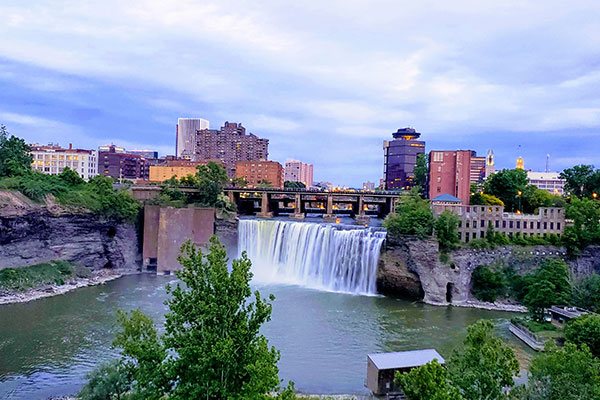
Rochester, NY is home to many people, businesses, and cultural events. Did you know that Rochester sits amidst the Genesee River Watershed? What does this mean?
It means that we are in a highly populated area that has a major water drainage basin (watershed). All water, whether it be from rain or snow-melt, will run off the land into drainage ditches which feed into other bodies of water like a pond or stream.
This happens even if you don’t live close. In the Rochester, NY area, all runoff travels and makes its way to Lake Ontario. Interesting right? But you wonder why this is all important…it’s important because living in a watershed area can make homes more prone to flooded basement situations.
What Causes a Flooded Basement?
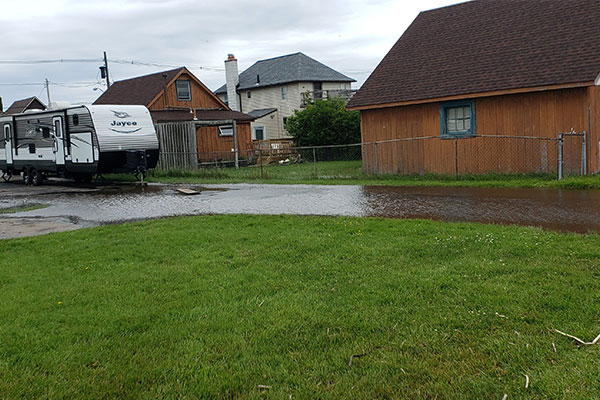
Basements can have many different purposes in a home. For some, it is a finished space that is used as a living space.
Some have a second kitchen area and can be used as a “mini apartment”. Other basements may be finished but used as an entertainment space: movie room, man cave, game area.
Most commonly, basements are used for laundry and storage and sometimes partially finished. Regardless of what your basement is used for, there is a chance to end up with a flooded basement.
Here are some common reasons a basement may flood.
What Causes a Flooded Basement?
Plumbing issues are a major culprit in flooded basements. Whether it’s the pipes that get water within your home, or waste line pipes, any blockage or burst of the pipe can cause an excess amount of water to flow into the basement of your home.
If a pipe is not completely broken, a slow leak could also be a cause of a flood. Additionally, it is common for appliances such as a washer, sump-pump, and water heater to stop working and cause a flood as well.
Poorly Sealed Windows/Doors
Some basements have recess windows and doors which if not sealed properly or broken can allow water into the basement. If the ground surrounding the window/door area gets oversaturated then the water can possibly leak through. Maybe the water hose was left on by accident causing water to flow right in the poorly sealed window.
Cracks in Foundation
Foundation cracks are a major issue in a home with a basement. Groundwater can leak through even without rain. The moisture can seep through the cement flooring and cinder block walls.
Often, this moisture issue is a slowly evolving problem. Without proper ventilation, the moisture and water will continue to increase resulting in a small flooded area of the basement.
Drainage Issues
When your home was built, specific drainage areas are added to try and ensure that any runoff is going away from the home. Over time, changes are made, and landscaping is added.
Sometimes, these changes can be an issue with drainage and not allow water to move away from the home. Sometimes a simple change to the landscape can help with drainage.
In addition to the poor drainage, if the basement was not sealed or waterproofed properly, it will be more likely to have a flooded basement situation.
Flooded Basement Caused by Rain
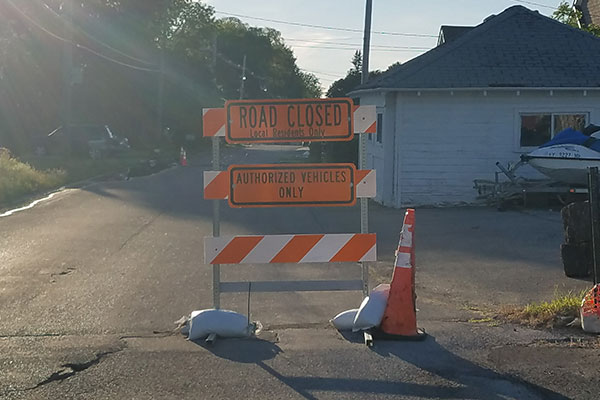
A Flooded Basement in Rochester, NY is quite common all year round. The weather here constantly changes even in the middle of winter. When there is an excess amount of rain, or snow that melts quickly, the likelihood for a flooded basement increases.
When rain comes quickly, it can’t absorb into the ground quick enough causing ponding in yards, overflowing creeks and ponds and oversaturated land. Depending on where you live, the lake levels can rise and with enough wind can cause major flooding along beaches and coastal homes.
The excess water doesn’t have anywhere to go and in a poorly waterproofed basement, it is highly likely a basement flood will occur. Rochester winters can be brutal, accumulating over a foot of snow.
Suddenly, the weather turns warm and all the snow melts. This causes a large amount of runoff caused by the snowmelt. Some areas are more prone to this issue, but it is a common cause for flooded basements.
What to Do If You Have a Flooded Basement
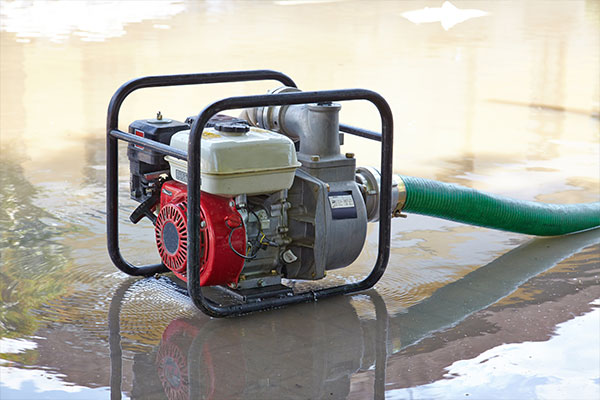
Imagine going to your basement with a load of laundry in your hands. You step off the last step and hear a splash.
Your foot is soaking wet and you instantly panic because you have no idea what happened, you just know there is water in your basement.
Follow these steps to help you with your flooded basement!
- Depending on the severity of the basement flood, you should first turn off any power to the basement area. If this can’t be done safely, it would be best to contact an electrician or your local fire department.
- If you can (again, safely) find and turn off the source of water. This would be in the event of a burst or leaking pipe within the basement area.
If the flood is due to something else, you won’t be able to stop the water. TIP: If your basement has a floor drain, check to be sure it is not clogged or blocked by anything.
- Wearing water boots and gloves, remove anything that is trash from the flooded area. This can include actual trash, or items that have been ruined by the water.
Also, if any debris is floating, that should be removed also to prevent any injuries or further damage.
- Start removing the standing water from the floor. You can use a shop-vac which can usually be used for both wet and dry materials.
Since the electricity shouldn't be used in the basement, it would be best to use a heavy-duty extension cord and use a plug in another area of the home. You can also use a mop and bucket to get rid of any water.
If there is too much water, it is best to have an emergency response team like Rock Emergency come and do a complete pump-out of your flooded basement.
- Once trash and water have been removed, start taking out any items that are not ruined, just wet. Get them to a dry space to start drying out. If necessary, these items can be professionally cleaned (another service that can be provided by Rock Emergency).
- Next, the problem needs to be fixed. Whatever was the cause of the flooded basement needs to be taken care of, or the issue will happen again. If it was faulty plumbing, pipes need to be fixed.
If an appliance broke, it should be fixed or replaced. If the flood was due to excess rainfall or poor construction of the basement, other measures must be taken to prevent this from happening again.
- After all items have been removed from the basement, evaluation of the walls and flooring needs to be done. Rock Emergency can do this for you also!
It is important, if you have a finished basement, to get rid of any type of carpeted flooring. Wet carpets are the perfect breeding ground for mold, as is wet drywall. If any drywall is wet, it must be cut.
Contractors will perform what is called a “flood cut” which means the drywall is cut 12-18 inches above the flood line. This will all need to be replaced, there is no saving drywall that has been affected by flood damage.
- The basement will need to be dried out. Using large fans or air movers, dehumidifiers, and open windows will be best to dry out the space.
- When everything is back to normal, a prevention plan needs to be in place, so you don’t have to go through this again!
How to Prevent a Flooded Basement
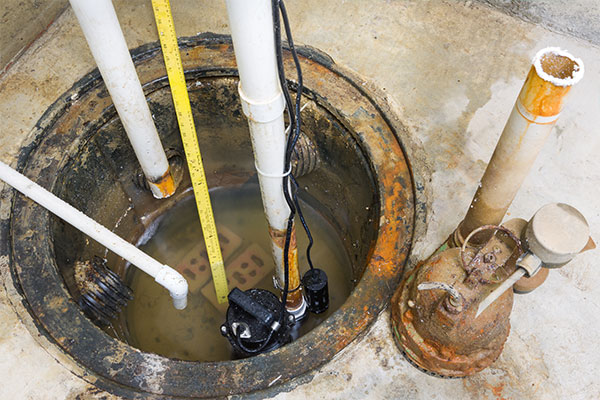
After dealing with all the issues of having a flooded basement, it is best to know what should be done to help prevent it from happening again (or ever). It is important to make sure the basement is properly sealed and waterproofed.
Additionally, make sure that all runoff of groundwater is moving away from your home. No matter if you live in a watershed area, like Rochester, NY, or somewhere else, it is beneficial to have a sump-pump in your basement.
These are designed to pump groundwater away from your home. Once the water reaches a certain level and starts dumping into the sump pump pit, it will automatically turn on to pump out the water.
Make sure you have one, and make sure it functions correctly. Power outages can cause the pump to not work, so a backup battery should be available in the event of a power outage.
What is the Flooded Basement Cleanup Cost?
The cost to cleanup and repair a flooded basement will vary depending on the severity of the flood. A pump-out service cost could range from $500-$1,000 or more depending on how much water is in the basement.
The repairs can be anywhere from $2,000 to $10,000 depending on what repairs are needed. When the damage affects the structure and/or appliances, the costs incurred are likely going to be higher.
Dealing with a flooded basement isn’t easy: it can be stressful and frustrating at the same time. If the flooded area of the basement is small, and the basement isn’t finished (no carpeting or drywall) it can be relatively easy to cleanup the water yourself.
If the basement is finished, or there is several inches of water and obvious water damage, it is best to have Rock Emergency work with your insurance company and get your basement back into tip top shape!
If you or someone you know is dealing with a Flooded Basement, call our Rock Emergency professionals at (585) 413-1566. Or click the button below to send us a message!
Share this Post

